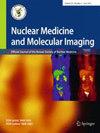Molecular Imaging in Recurrent Prostate Cancer Presented as a Mixed Small Neuroendocrine Tumor/Acinar Adenocarcinoma.
IF 2.7
Q3 RADIOLOGY, NUCLEAR MEDICINE & MEDICAL IMAGING
Nuclear Medicine and Molecular Imaging
Pub Date : 2023-08-01
Epub Date: 2023-04-05
DOI:10.1007/s13139-023-00800-x
引用次数: 0
Abstract
Molecular imaging is an important tool for evaluating patients with prostate cancer, including those with hybrid histopathology. Although rare, mixed small neuroendocrine tumor/acinar adenocarcinoma exhibit aggressive behavior that necessitates optimal therapy. Molecular imaging has been implemented previously to assess radioligand therapy eligibility in such cases. Interestingly, the uptake of radiotracers targeting prostate-specific membrane antigen (PSMA) and somatostatin receptor may be reduced and can potentially lead to false negative readings in certain tumor types with hybrid features. Therefore, physicians should be aware of different kinds of disparities when assessing these tumor types with the aforementioned modalities.
复发性前列腺癌癌症的分子成像表现为神经内分泌小肿瘤/腺泡腺癌。
分子成像是评估癌症前列腺患者(包括混合组织病理学患者)的重要工具。尽管罕见,但混合性小神经内分泌肿瘤/腺泡腺癌表现出侵袭性行为,需要最佳治疗。分子成像以前已经被用于评估这种情况下的放射性配体治疗资格。有趣的是,靶向前列腺特异性膜抗原(PSMA)和生长抑素受体的放射性示踪剂的摄取可能会减少,并可能导致某些具有混合特征的肿瘤类型的假阴性读数。因此,医生在用上述方法评估这些肿瘤类型时,应该意识到不同类型的差异。
本文章由计算机程序翻译,如有差异,请以英文原文为准。
求助全文
约1分钟内获得全文
求助全文
来源期刊

Nuclear Medicine and Molecular Imaging
RADIOLOGY, NUCLEAR MEDICINE & MEDICAL IMAGING-
CiteScore
2.20
自引率
7.70%
发文量
58
期刊介绍:
Nuclear Medicine and Molecular Imaging (Nucl Med Mol Imaging) is an official journal of the Korean Society of Nuclear Medicine, which bimonthly publishes papers on February, April, June, August, October, and December about nuclear medicine and related sciences such as radiochemistry, radiopharmacy, dosimetry and pharmacokinetics / pharmacodynamics of radiopharmaceuticals, nuclear and molecular imaging analysis, nuclear and molecular imaging instrumentation, radiation biology and radionuclide therapy. The journal specially welcomes works of artificial intelligence applied to nuclear medicine. The journal will also welcome original works relating to molecular imaging research such as the development of molecular imaging probes, reporter imaging assays, imaging cell trafficking, imaging endo(exo)genous gene expression, and imaging signal transduction. Nucl Med Mol Imaging publishes the following types of papers: original articles, reviews, case reports, editorials, interesting images, and letters to the editor.
The Korean Society of Nuclear Medicine (KSNM)
KSNM is a scientific and professional organization founded in 1961 and a member of the Korean Academy of Medical Sciences of the Korean Medical Association which was established by The Medical Services Law. The aims of KSNM are the promotion of nuclear medicine and cooperation of each member. The business of KSNM includes holding academic meetings and symposia, the publication of journals and books, planning and research of promoting science and health, and training and qualification of nuclear medicine specialists.
 求助内容:
求助内容: 应助结果提醒方式:
应助结果提醒方式:


